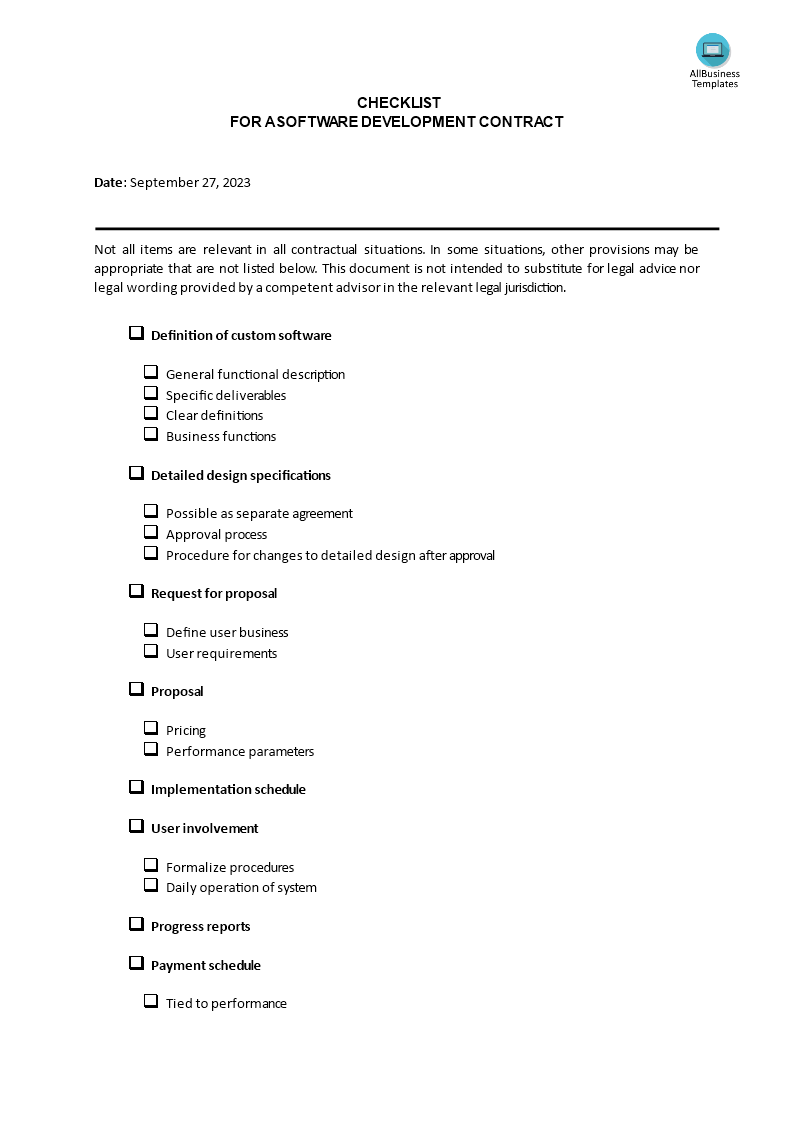Software Development Contract Checklist
Save, fill-In The Blanks, Print, Done!

Download Software Development Contract Checklist
Today: USD 1.99
Download It Now

Available premium file formats:
Microsoft Word (.docx)- This Document Has Been Certified by a Professional
- 100% customizable
- This is a digital download (40.44 kB)
- Language: English
- You will receive a link to download the file as soon as your payment goes through.
- We recommend downloading this file onto your computer.
Are you looking for a listing to go along with your software checklist? How should a software development contract be structured? The Software checklist template is a useful tool that helps to keep track of all software-related tasks. It includes sections for tasks related to the installation, configuration, and testing of software. Download this professional Software Development Contract Checklist template now!
A "Software Development Contract Checklist" is a comprehensive list of key items and considerations that should be addressed when drafting or reviewing a software development contract. This checklist is used to ensure that all critical aspects of the software development project are properly documented and agreed upon by both parties involved—the client (often referred to as the "customer" or "client") and the software development company or developer (often referred to as the "provider" or "vendor").
A well-structured software development contract helps clarify expectations, responsibilities, timelines, payment terms, and other important project details. Here is a checklist of common items to include in a software development contract:
- Parties Involved:
- Names and contact information of the client and the software development company.
- Legal entities and addresses of both parties.
- Project Description:
- Detailed description of the software development project, including its scope, objectives, and goals.
- Specific features, functionalities, and deliverables to be developed.
- Project Timeline:
- Start date and estimated completion date.
- Milestones or project phases with associated deadlines.
- Payment Terms:
- Payment schedule, including amounts, due dates, and payment methods.
- Conditions for payment, such as upfront deposits or progress payments.
- Scope Changes:
- Procedures for handling change requests, including additional work, modifications, or deviations from the original scope.
- How changes affect project timelines and costs.
- Intellectual Property:
- Ownership of intellectual property rights (e.g., copyrights, patents, and trademarks).
- Conditions for licensing or transferring intellectual property.
- Confidentiality and Non-Disclosure:
- Obligations related to the protection of confidential information.
- Non-disclosure agreements (NDAs) and confidentiality clauses.
- Warranties and Guarantees:
- Any warranties or guarantees related to the software's performance, quality, or functionality.
- Procedures for addressing defects or issues.
- Testing and Acceptance Criteria:
- Criteria for testing and accepting the software, including testing phases and acceptance criteria.
- How defects or non-conformance will be addressed.
- Termination and Cancellation:
- Conditions and procedures for terminating the contract.
- Termination penalties or fees, if applicable.
- Liability and Indemnification:
- Liability limits and responsibilities in case of damages, breaches, or legal disputes.
- Indemnification clauses protect both parties.
- Support and Maintenance:
- Terms and costs associated with post-launch support, updates, and maintenance.
- Response times for addressing issues.
- Dispute Resolution:
- Procedures for resolving disputes, including mediation, arbitration, or litigation clauses.
- Choice of law and jurisdiction.
- Insurance:
- Whether the software development company carries professional liability insurance and the coverage limits.
- Client Responsibilities:
- Client's obligations, such as providing necessary information, feedback, and access to resources.
- Cancellation and Refund Policy:
- Terms and conditions for canceling the project and any applicable refund policies.
- Signatures and Execution:
- Signature lines for both parties to indicate their acceptance and agreement to the terms.
- Appendices and Attachments:
- Any additional documents, specifications, or technical details relevant to the project.
A well-drafted software development contract helps mitigate risks, ensures clarity in expectations, and serves as a legally binding agreement between the client and the software development provider.
Download this Software Development Contract Checklist template now!
DISCLAIMER
Nothing on this site shall be considered legal advice and no attorney-client relationship is established.
Leave a Reply. If you have any questions or remarks, feel free to post them below.
Related templates
Latest templates
Latest topics
- GDPR Compliance Templates
What do you need to become GDPR compliant? Are you looking for useful GDPR document templates to make you compliant? All these compliance documents will be available to download instantly... - Google Docs Templates
How to create documents in Google Docs? We provide Google Docs compatible template and these are the reasons why it's useful to work with Google Docs... - IT Security Standards Kit
What are IT Security Standards? Check out our collection of this newly updated IT Security Kit Standard templates, including policies, controls, processes, checklists, procedures and other documents. - Letter Format
How to format a letter? Here is a brief overview of common letter formats and templates in USA and UK and get inspirited immediately! - Google Sheets Templates
How to work with Google Sheets templates? Where to download useful Google Sheets templates? Check out our samples here.
cheese
